Related Research Articles
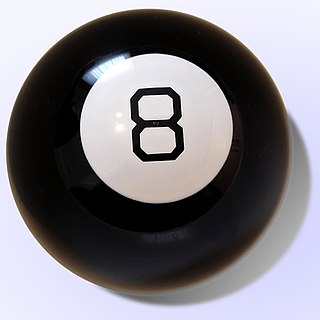
The Magic 8 Ball is a plastic sphere, made to look like an oversized eight ball, that is used for fortune-telling or seeking advice. It was invented in 1946 by Albert C. Carter and Abe Bookman and is currently manufactured by Mattel. The user asks a yes–no question to the ball, then turns it over to reveal an answer that floats up into a window.

A zipper, zip, fly, or zip fastener, formerly known as a clasp locker, is a commonly used device for binding together two edges of fabric or other flexible material. Used in clothing, luggage and other bags, camping gear, and many other items, zippers come in a wide range of sizes, shapes, and colors. In 1892, Whitcomb L. Judson, an American inventor from Chicago, patented the original design from which the modern device evolved.

A stapler is a mechanical device that joins pages of paper or similar material by driving a thin metal staple through the sheets and folding the ends. Staplers are widely used in government, business, offices, work places, homes and schools.

A tape measure or measuring tape is a flexible ruler used to measure length or distance.
Novelty is the quality of being new, or following from that, of being striking, original or unusual. Novelty may be the shared experience of a new cultural phenomenon or the subjective perception of an individual.
Novelty is one of the patentability requirement for a patent claim, whose purpose is to prevent issuing patents on known things, i.e. to prevent public knowledge from being taken away from the public domain.

A novelty item is an object which is specifically designed to serve no practical purpose, and is sold for its uniqueness, humor, or simply as something new. The term also applies to practical items with fanciful or nonfunctional additions, such as novelty aprons, slippers, or toilet paper. The term is normally applied to small objects, and is generally not used to describe larger items such as roadside attractions. Items may have an advertising or promotional purpose, or be a souvenir.
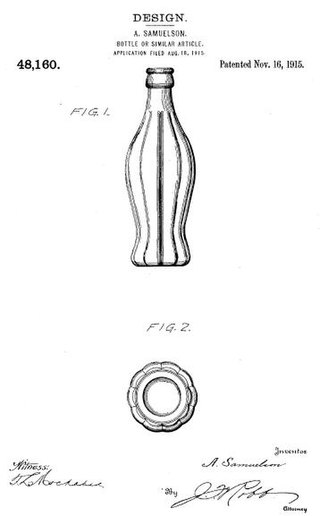
In the United States, a design patent is a form of legal protection granted to the ornamental design of an article of manufacture. Design patents are a type of industrial design right. Ornamental designs of jewelry, furniture, beverage containers and computer icons are examples of objects that are covered by design patents.
Elijah Jefferson Bond was an American lawyer and inventor. He is best known for patenting the ouija board.
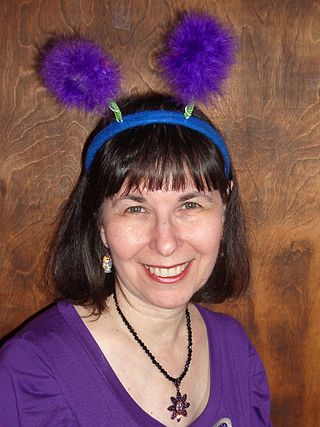
A deely bobber is a novelty item of headgear comprising a headband to which are affixed two springy protrusions resembling the antennae of insects. These "antennae" may be topped with simple plastic shapes or more elaborate and fanciful decorations, such as mini pom poms or light-emitting diodes. The name "deely bobber" is a genericized trademark; other names include deely-boppers, bonce boppers, head boppers, or space boppers. The product was introduced in 1981 and quickly became a fad of the 1980s. In June 1982, a headline of The New York Times called them Martian antennae.

Marvin Glass and Associates (MGA) was a toy design and engineering firm based in Chicago. Marvin Glass (1914–1974) and his employees created some of the most successful toys and games of the twentieth century such as Mr. Machine, Rock 'Em Sock 'Em Robots, Lite Brite, Ants in the Pants, Mouse Trap, Operation, Simon, Body Language, and the Evel Knievel Stunt Cycle.

Wax lips are the common name of a confectionery item made of colored and flavored food-grade paraffin wax, molded to resemble a pair of oversized red lips. They were most popular in the 1970s and currently are sold by Tootsie Roll Industries as Wack-O-Wax.
The Mills Novelty Company, Incorporated of Chicago was once a leading manufacturer of coin-operated machines, including slot machines, vending machines, and jukeboxes, in the United States. Between about 1905 and 1930, the company's products included the Mills Violano-Virtuoso and its predecessors, celebrated machines that automatically played a violin and, after about 1909, a piano. By 1944, the name of the company had changed to Mills Industries, Incorporated. The slot machine division was then owned by Bell-O-Matic Corporation. By the late 1930s, vending machines were being installed by Mills Automatic Merchandising Corporation of New York.

Gund Manufacturing Company is a Canadian-owned manufacturer of plush stuffed animals. The company is based in Edison, New Jersey, and distributes throughout the United States and Canada as well as in Europe, Japan, Australia, and South America. Gund is currently run by third generation family owner Bruce Raiffe whose grandfather Jacob Swedlin purchased the company from the original founder in 1925. Their slogan is “Gotta Getta Gund”.

Juro Novelty Company was a New York City based toy company headed by Sam Jupiter, and later by his daughter Vivian Kaplan. Juro manufactured composition ventriloquist dolls from 1949, to approximately 1957 by which time they used plastic for the head & hands instead. They produced toy versions of the following characters: Jerry Mahoney, Knucklehead Smiff, Charlie McCarthy, Mortimer Snerd, Danny O'Day, Farfel, Ricky Little, Lester, and Velvel. They also made Dick Clark, Dagmar, and Pinky Lee dolls in the 1950s, along with hand puppets of Bil Baird's characters.
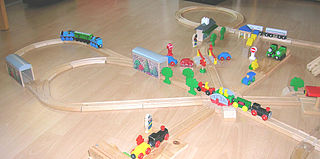
Wooden toy trains are toy trains that run on a wooden track system with grooves to guide the wheels of the rolling stock. While the trains, tracks and scenery accessories are made mainly of wood, the engines and cars connect to each other using metal hooks or small magnets, and some use plastic wheels mounted on metal axles. Some trains are made to resemble anthropomorphical, fictional, and prototypical railroad equipment.
The Vac-u-form, was a toy invented by Eddy Goldfarb and released by Mattel in the 1960s around 1961 with the trademark filed on October 8, 1962.
A. Eddy Goldfarb is an American toy inventor. The creator of over 800 toys, he is best known for inventing Yakity Yak Talking Teeth, Battling Tops, KerPlunk, Stompers, and Vac-U-Form. He is the subject of the award-winning short film Eddy's World.
Eddy's World is a 2020 American documentary short film directed and produced by filmmaker Lyn Goldfarb, Eddy's daughter. Eddy's World was streamed on NewYorker.com. There are two versions of Eddy's World: an 18-minute version for festivals and streaming, and a 28-minute director's cut. Eddy’s World premiered at Mountainfilm Festival in May 2020.
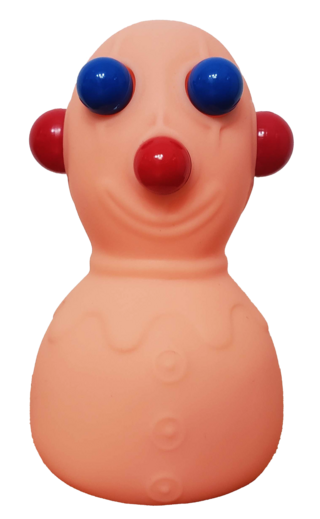
Panic Pete, also known as Jo-Bo, Obie, The Martian Popping Doll, The Martian Popping Thing, Popping Martian or Bug-Out Bob is a novelty rubber squeeze toy invented by John M. Auzin.
References
- 1 2 Newgarden, Mark; Picturebox Inc. (2004). Cheap Laffs: The Art of the Novelty Item. New York: Harry N. Abrams, Inc. pp. 54–55. ISBN 0-8109-5599-7.